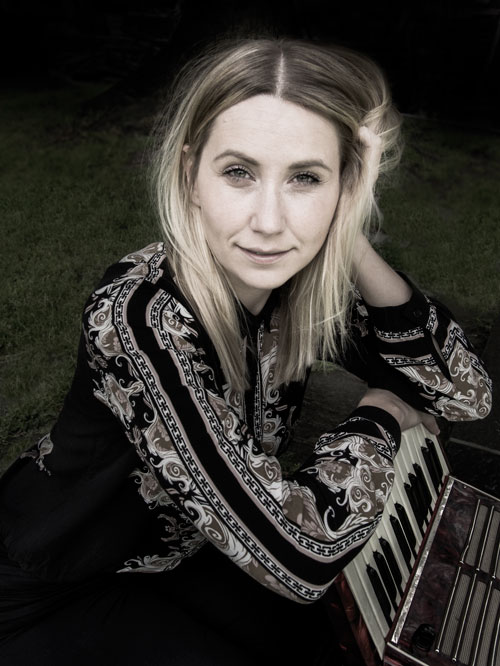Ever since I came to New York, grounding seems to be an never ending story. First the fact, that we, as a family, are putting down new roots over here. Then the fun fact that nobody knows how to say my name, so I was call Grounded Guru in acting class, the whole of last week. Not to oversee my lack of grounding, starting Actors Therapy the same week (staring my devil into his eyes). And not to mention, that everybody just seems so grounded over here – like they are though enough to face everything that this city will throw at them. Even the fortune cookie at our lokal Chinese, led me to grounding: “Feelings are ideas that have taken roots”. Ok – I take a hint – grounding is my next vocalgeek theme.
As a vocal coach, I’m a ferm believer, that if you have a good and flexible singing technique, it doesn’t matter how your stand or how you posture yourself while singing. You must be able to sing lying down, being thrown around, hanging upside down from the roof – or standing completely still, which kan be just as hard. But still – somewhere along the process of you mastering your technique, the way you are in your own body, always tend to come up. “Get yourself grounded and you can navigate even the stormiest roads in peace.” they say, but what is this grounding? Many, many years ago, Benjamin Franklin created lightning rods. As buildings became taller, lightning became more of a threat. The rods he created, are to be placed around a house, deep into the ground, to secure the house from lightning storms. When a lightning bolt is directed towards the house, the rods pics them up, and leads them safely deep into the ground, saving the house from being hit by the bolt and its full impact. People, who work a lot with grounding, say it is the same thing with us people, we need those lightning rods in real life. Therefor, I have collected some thoughts about grounding and how you can work with it, while singing. Remember, with this, as with everything I write – keep what feels right for you – and throw the rest away.
Yoga: I’ve always been a big fan of yoga, especially Bikram yoga – a challenging hot yoga series. When it comes to yoga, I think grounding is both a physical, and a spiritual, term. Both though, has to do with re-focusing our energy downwards. When we spend a lot of time, or maybe too much time, thinking or “being in our heads”, all our energy is directed upwards, and may cause stress or anxiety. Practicing yoga, can then be good for getting us connected to our body and to the ground again. And further, it can release energy, that you can use for ex. creating art. I stole this beautiful quote from a yoga site: “To make things happen, to put something into the world, we move downward. Starting with an idea in our heads, we visualize it in our mind’s eye. We verbalize the story, and start to build relationships from our heart. We center ourselves (in the solar plexus), begin to create, and finally see the physical object in the world.”
In yoga, you are also faced with the physical challenge of being grounded – if you are not able to keep up your balance, you fall. Flat on your stomach, or on your bum, as I must admit, I have done plenty of times.
An interesting exercise, I once met in yoga class, is a visualization. Visualize the following: “My body is like a tree, my tree has roots, my roots reach down to the Earth’s core, I can release fear (or tension, stress, anxiety, guilt, anger) through my roots and into the earth’s core”.
Alexander Technique: In Alexander Technique, grounding is the body releasing and lengthening in opposite directions muscularly, so that the body is fully expanded in all directions. By allowing the legs, the pelvis, and body to fully support the torso, the act of consciously grounding keeps a musician from straining the back. The body ideally should be in constant flow and movement. Good posture for singing is both an upward and a downward flow. During one course in the Alexander Technique for singers, I attended, they told me I should honor the “tripod” in each foot: heel + ball of big toe + ball of little toe. This is actually a good tip. Most of us stand on only some parts of our foot, and it can be really hard to activate our muscles, so that we stand in another way than our habit.
Dispokinesis: Dispokinesis is one of the things I am really curious about at the moment – but do not know so much about yet. A Dutch guy, G.O van de Klashorst, a physiotherapist and musician, is writing a lot about the chains of muscles in our body, and how these muscles are connected together and activates one another. He also writes about a small muscles called Pyramidalis – a muscle in our lower abdomen. You can maybe feel this muscles, as a muscle that moves outward when you cough, almost in the middle, between your hips. This muscles it is getting activated, and stays activated, when we get the right pressure on the front part of our foot, and getting our bodyweight a bit forward. A lot of people do not have this muscle activated, we tend to loose it at some point, growing up – maybe due to the fact, that we are sitting so much these days. The Pyramidalis works as a regulator for the diaphragm, and helps the air flow in and out in our body. It is also connected to the Linea Alba, a fibre structure, that is attached to the abdominal muscles we actually use while singing. As I said – do not know enough about this yet, but it seems so fascinating, and all this positive activity starts again, – down in our feet.
The cool thing, I personally find about grounding and grounding exercises, is when I do them, I feel that they are all increasing the resistance in our support while we are singing. In Complete Vocal Technique, we always stress that support is a continuous movement, as working through an resistance. This resistance is created a lot by the muscles of your back, especially the muscles in your lover back, the lumbar area, where your quadratus lumbourum muscles are located. I find that these muscles are easier activated, when as described above, you plant your legs in the earth, directing some firm pressure downwards, and act as you where “singing with your whole body” from head to toe, or more correct from toe to head. This can help f.ex if you have a tendency to lock your support muscles while singing. I also find that the grounding exercises, helps you train being present in the moment. Which is so important when you want freedom in your singing – but that is, my friends – a whole other chapter to be described. I off course, I will come back till that, at some point. But until then: I am a tree – and my tree has roots – in New York City!


2 Comments
Thanks for sharing all this, my friend. Great food for thought and interesting stuff. I sure would like to follow in your steps over there :)
Thank you too, my friend - I think we would be really great in NYC together. Study group when I get home? G
Leave A Comment